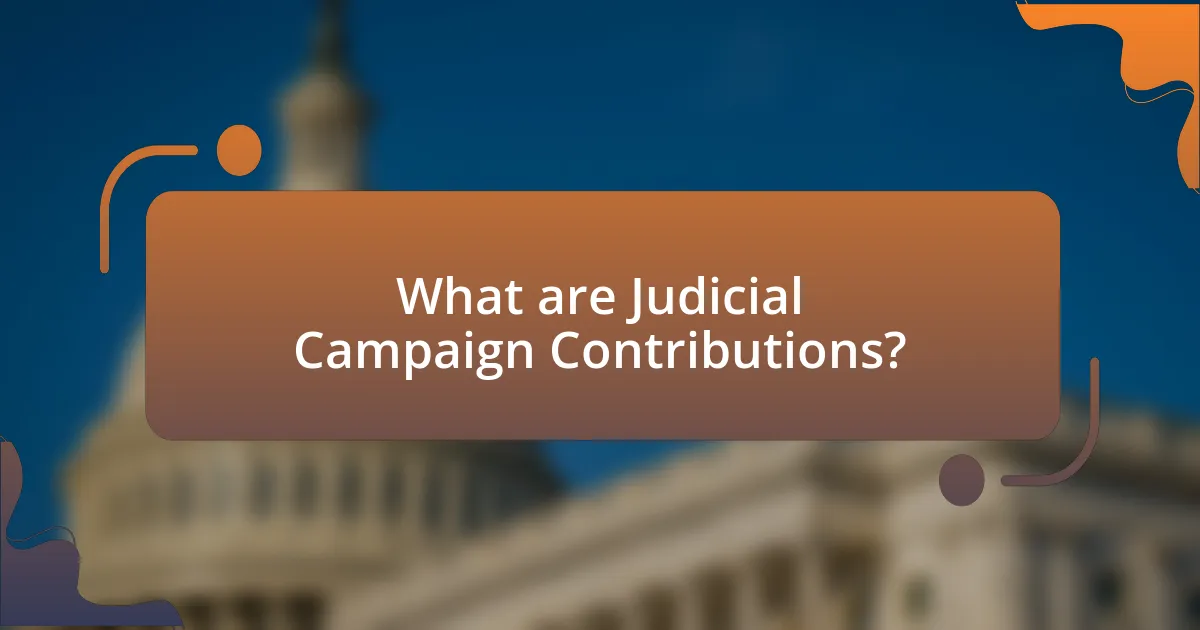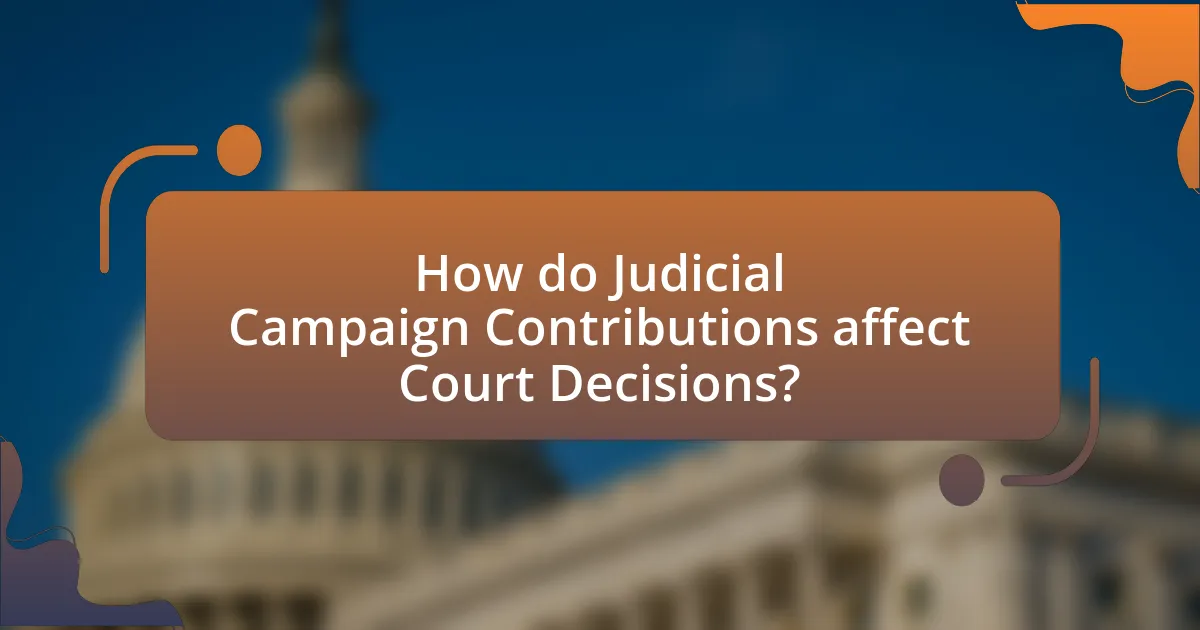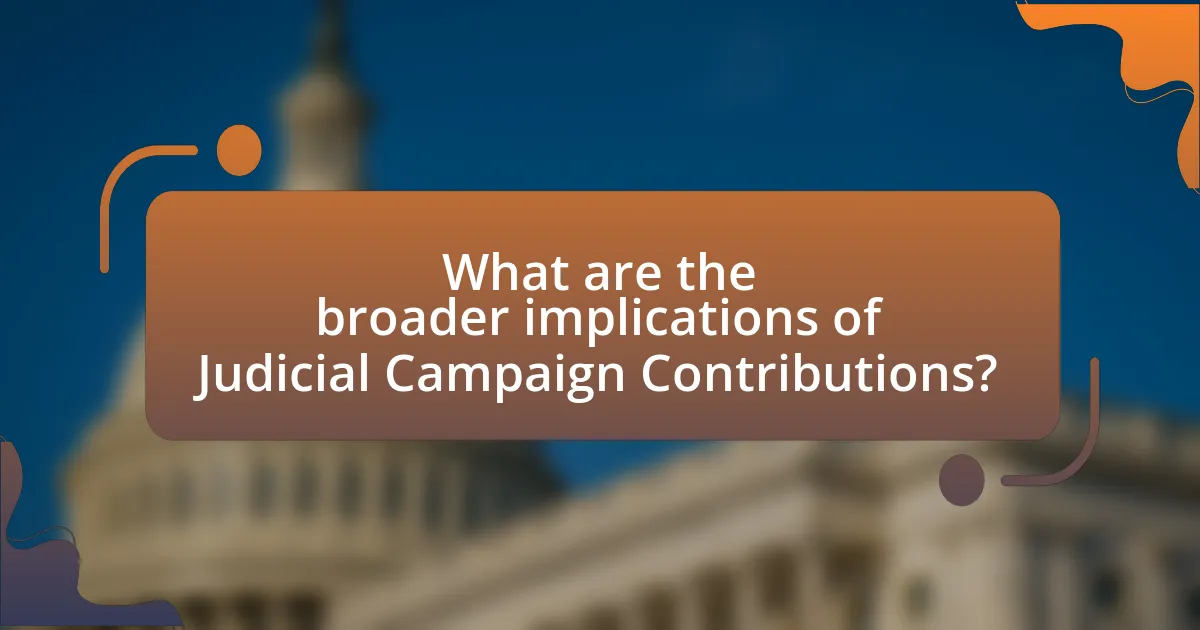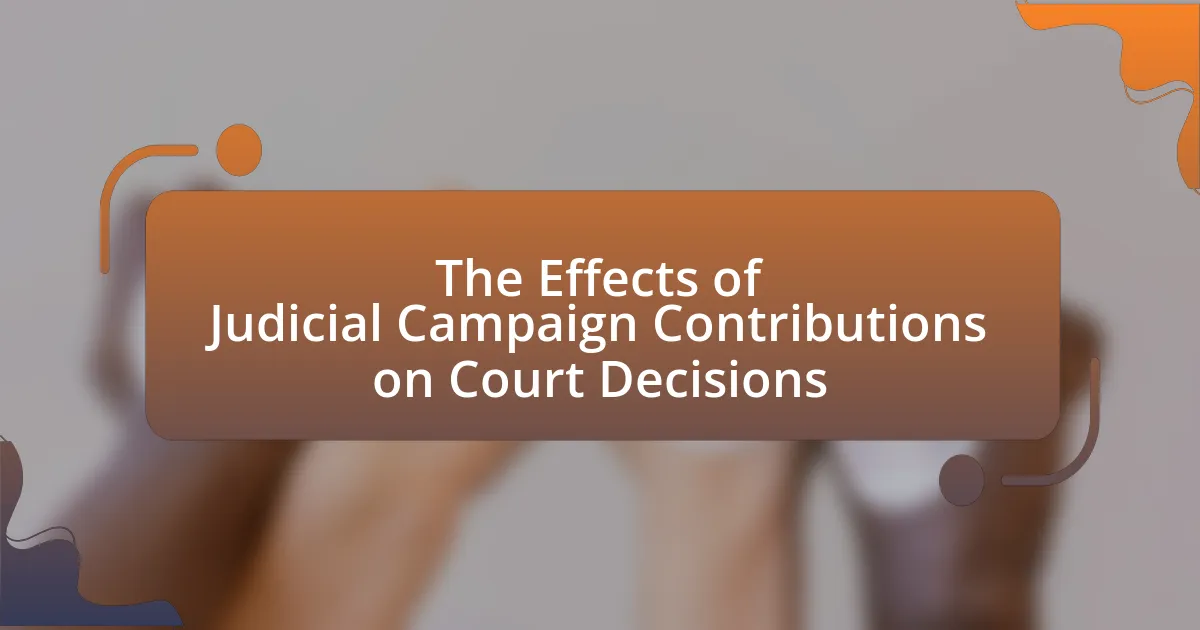Judicial campaign contributions refer to financial donations made to candidates seeking judicial office, which can significantly influence election outcomes and judicial impartiality. This article examines how these contributions function within the legal system, their sources, and the regulations governing them. It highlights the impact of campaign financing on judicial decisions, particularly in cases involving business interests, and discusses the ethical concerns surrounding potential biases. Additionally, the article explores proposed reforms aimed at mitigating the effects of contributions on judicial independence and public trust in the legal system.

What are Judicial Campaign Contributions?
Judicial campaign contributions are financial donations made to candidates running for judicial office, such as judgeships. These contributions can influence the election outcomes and potentially affect judicial impartiality, as candidates may feel beholden to their donors. Research indicates that significant contributions can lead to a perception of bias in judicial decisions, as seen in studies analyzing the correlation between campaign financing and rulings in cases involving contributors. For instance, a study published in the “American Journal of Political Science” found that judges who received substantial contributions from certain interest groups were more likely to rule in favor of those groups in relevant cases.
How do Judicial Campaign Contributions function within the legal system?
Judicial campaign contributions function within the legal system by influencing the election outcomes of judges, which can subsequently affect their decision-making on cases. Contributions from individuals, organizations, or interest groups can create a perception of bias or favoritism, as judges may feel beholden to their financial backers. Research indicates that judges who receive substantial campaign contributions may be more likely to rule in favor of the interests of their contributors, particularly in cases involving business or regulatory issues. For example, a study published in the American Political Science Review found that campaign contributions significantly correlated with judicial decisions in favor of contributors, highlighting the potential impact of financial support on judicial impartiality.
What are the sources of Judicial Campaign Contributions?
Judicial campaign contributions primarily come from individual donors, law firms, corporations, and political action committees (PACs). Individual donors often include attorneys and other professionals who may have interests in judicial outcomes. Law firms contribute to support candidates who align with their legal interests, while corporations may provide funding to influence judicial decisions that affect their business operations. PACs, which aggregate contributions from various sources, also play a significant role in funding judicial campaigns. According to the Brennan Center for Justice, in 2019, over $200 million was spent on state judicial elections, highlighting the substantial financial influence these sources exert on the judicial election process.
How are these contributions regulated?
Judicial campaign contributions are regulated primarily through state laws and federal regulations that govern campaign financing. Each state has its own set of rules regarding the amount individuals and organizations can contribute to judicial candidates, often including limits on contributions and requirements for disclosure of donors. For instance, the American Bar Association recommends that states adopt contribution limits to prevent undue influence on judges, and many states have implemented such measures. Additionally, the Federal Election Commission oversees contributions to federal judicial campaigns, ensuring compliance with federal laws. These regulations aim to maintain the integrity of the judiciary by minimizing the potential for conflicts of interest and ensuring transparency in the funding of judicial elections.
Why do candidates seek Judicial Campaign Contributions?
Candidates seek judicial campaign contributions primarily to finance their election campaigns and ensure their visibility to voters. These contributions are essential for covering costs such as advertising, outreach, and campaign events, which are crucial for gaining public support. Research indicates that judicial candidates often rely on these funds to compete effectively, as elections can be costly; for instance, a study by the Brennan Center for Justice found that state supreme court races can exceed $1 million in spending. Additionally, contributions can help candidates build networks and gain endorsements, further enhancing their chances of winning.
What role do contributions play in judicial elections?
Contributions play a significant role in judicial elections by influencing candidate visibility and campaign viability. Financial support from donors can enhance a candidate’s ability to communicate their message, reach voters, and compete effectively against opponents. Research indicates that candidates who receive substantial contributions are more likely to win elections; for instance, a study by the Brennan Center for Justice found that in states with competitive judicial elections, candidates who raised more money had a higher likelihood of victory. This financial backing can also lead to potential conflicts of interest, as judges may feel beholden to their contributors once elected, impacting their decision-making on the bench.
How do contributions influence candidate visibility and outreach?
Contributions significantly enhance candidate visibility and outreach by providing financial resources necessary for effective campaigning. These resources enable candidates to invest in advertising, outreach programs, and events that increase their public presence. For instance, a study by the Brennan Center for Justice found that candidates with higher campaign contributions are more likely to secure media coverage and engage in voter outreach activities, leading to increased recognition among constituents. This visibility is crucial in competitive elections, as it directly correlates with voter awareness and support.

How do Judicial Campaign Contributions affect Court Decisions?
Judicial campaign contributions significantly influence court decisions by creating potential biases in judges’ rulings. Research indicates that judges who receive substantial financial support from specific interest groups or individuals may feel pressured to favor those contributors in their judicial decisions. For instance, a study published in the “American Political Science Review” by authors like Michael J. Nelson and others found that campaign contributions can lead to increased likelihood of rulings that align with the interests of donors, particularly in cases involving business regulations and tort reform. This correlation suggests that the financial backing received during campaigns can compromise judicial impartiality, ultimately affecting the fairness of legal outcomes.
What evidence exists linking contributions to judicial outcomes?
Evidence linking contributions to judicial outcomes includes studies demonstrating that campaign donations influence judges’ decisions. For instance, a study by the American Bar Association found that judges who received significant contributions from attorneys or interest groups were more likely to rule in favor of those contributors in subsequent cases. Additionally, research published in the Journal of Politics indicated that higher campaign contributions correlated with favorable rulings in cases involving the contributors’ interests. These findings suggest a tangible relationship between financial contributions and judicial decision-making.
How do contributions impact case rulings?
Contributions impact case rulings by influencing judges’ decisions through perceived or actual biases created by financial support. Research indicates that judges who receive campaign contributions from specific interest groups are more likely to rule in favor of those groups in relevant cases. For instance, a study by the Brennan Center for Justice found that judges in states with high levels of campaign contributions were more likely to favor corporate interests in tort cases, demonstrating a correlation between financial backing and judicial outcomes. This suggests that contributions can create a conflict of interest, ultimately affecting the impartiality of judicial decisions.
What types of cases are most affected by Judicial Campaign Contributions?
Judicial campaign contributions most significantly affect cases involving business interests, tort reform, and criminal justice. Research indicates that judges who receive substantial contributions from corporate donors are more likely to rule in favor of those businesses in litigation. For example, a study by the Brennan Center for Justice found that in states with high levels of campaign contributions, judges were more inclined to favor corporate defendants over plaintiffs in tort cases. Additionally, contributions can influence sentencing decisions in criminal cases, where judges may show leniency towards defendants who have financially supported their campaigns.
Why is the relationship between contributions and decisions controversial?
The relationship between contributions and decisions is controversial because it raises concerns about judicial impartiality and the potential for bias in court rulings. Studies have shown that judges who receive campaign contributions from specific interest groups may be influenced in their decision-making, leading to perceptions of favoritism or corruption. For instance, research published in the American Political Science Review indicates that judges are more likely to rule in favor of contributors in cases involving those contributors’ interests, suggesting a direct link between financial support and judicial outcomes. This dynamic challenges the integrity of the judicial system and fuels debates about the appropriateness of campaign financing in judicial elections.
What ethical concerns arise from Judicial Campaign Contributions?
Judicial campaign contributions raise significant ethical concerns, primarily regarding the potential for bias and conflicts of interest in judicial decision-making. When judges receive substantial financial support from individuals or organizations, there is a risk that their impartiality may be compromised, leading to decisions that favor contributors rather than upholding justice. Research indicates that judges who receive campaign contributions from attorneys or litigants involved in cases before them may exhibit biased rulings, as evidenced by studies showing correlations between contributions and favorable outcomes for donors. This undermines public trust in the judicial system, as citizens may perceive that justice is for sale, rather than being administered fairly and equitably.
How do different jurisdictions address these concerns?
Different jurisdictions address concerns related to judicial campaign contributions through various regulatory frameworks and transparency measures. For instance, some states impose strict limits on campaign contributions to judicial candidates, aiming to reduce potential conflicts of interest and maintain impartiality in court decisions. In contrast, other jurisdictions may have more lenient regulations, allowing larger contributions but requiring disclosure of donors, which is intended to promote transparency and public awareness. Research indicates that states with stricter contribution limits tend to report fewer instances of perceived bias in judicial rulings, highlighting the effectiveness of such regulations in mitigating the influence of money on judicial decisions.

What are the broader implications of Judicial Campaign Contributions?
Judicial campaign contributions can significantly influence the impartiality and integrity of the judicial system. When judges receive substantial financial support from specific interest groups or individuals, it raises concerns about potential biases in their rulings, as they may feel beholden to their contributors. Research indicates that judges who receive campaign contributions from businesses are more likely to rule in favor of those businesses in cases that come before them. For instance, a study published in the American Economic Journal found that judges who received contributions from tort reform advocates were more likely to favor defendants in tort cases. This correlation suggests that the financial dynamics of judicial campaigns can undermine public confidence in the judiciary, leading to perceptions of a compromised legal system where justice may be influenced by monetary interests rather than legal principles.
How do contributions affect public perception of the judiciary?
Contributions significantly influence public perception of the judiciary by creating a perception of bias and undermining trust in judicial impartiality. Research indicates that when judges receive campaign contributions from specific interest groups or individuals, the public may view their decisions as influenced by those contributors rather than by legal principles. For instance, a study published in the “American Economic Journal” by authors like David E. Lewis and others found that increased campaign contributions correlate with a decline in public confidence in judicial fairness. This perception can lead to skepticism about the integrity of judicial outcomes, as citizens may believe that financial support affects judges’ rulings, thereby eroding the foundational principle of an independent judiciary.
What impact do contributions have on trust in the legal system?
Contributions significantly undermine trust in the legal system by creating perceptions of bias and favoritism. Research indicates that when judges receive campaign contributions from specific interest groups, it raises concerns about their impartiality in decision-making. For instance, a study published in the Journal of Politics found that judges who received contributions from attorneys were more likely to rule in favor of those attorneys’ clients, suggesting a direct link between financial support and judicial outcomes. This perceived conflict of interest can lead to a decline in public confidence, as citizens may believe that justice is influenced by money rather than fairness and equality.
How do contributions influence the independence of the judiciary?
Contributions influence the independence of the judiciary by creating potential conflicts of interest and undermining impartiality. When judges receive campaign contributions from individuals or organizations, they may feel pressured to rule in favor of those contributors, thereby compromising their ability to make unbiased decisions. Research indicates that judges who receive significant contributions from certain interest groups are more likely to favor those groups in their rulings. For example, a study published in the “American Political Science Review” found that campaign contributions can lead to biased judicial outcomes, particularly in cases involving business interests. This evidence highlights the detrimental impact of financial contributions on judicial independence, as they can distort the fundamental principle of impartial justice.
What reforms are being proposed to address the effects of contributions?
Proposed reforms to address the effects of contributions in judicial campaigns include implementing stricter campaign finance laws, establishing public financing for judicial elections, and enhancing transparency in campaign contributions. Stricter campaign finance laws aim to limit the amount of money that can be contributed to judicial candidates, thereby reducing the influence of large donors on court decisions. Public financing initiatives would provide candidates with state funds, allowing them to run competitive campaigns without relying heavily on private contributions. Enhanced transparency measures would require candidates to disclose their contributors, enabling voters to understand potential conflicts of interest. These reforms are supported by studies indicating that judicial decisions can be swayed by the financial interests of contributors, highlighting the need for systemic changes to ensure impartiality in the judiciary.
What are the potential benefits of these reforms?
The potential benefits of reforms addressing judicial campaign contributions include increased impartiality in court decisions and enhanced public trust in the judicial system. By limiting the influence of money in judicial elections, these reforms can reduce the risk of bias, ensuring that judges make decisions based on law rather than financial interests. Studies have shown that states with stricter campaign finance laws for judicial elections report higher levels of public confidence in their courts, indicating a direct correlation between reform measures and perceived judicial integrity.
How can stakeholders advocate for change in this area?
Stakeholders can advocate for change in the area of judicial campaign contributions by promoting transparency and accountability in campaign financing. By supporting legislation that mandates full disclosure of campaign contributions, stakeholders can help ensure that the public is aware of potential influences on judicial decisions. Research indicates that states with stricter campaign finance laws experience less bias in judicial rulings, highlighting the importance of transparency in maintaining judicial integrity. Additionally, stakeholders can engage in public awareness campaigns to educate citizens about the implications of campaign contributions on judicial impartiality, thereby fostering a more informed electorate that demands reform.
What practical steps can be taken to mitigate the effects of Judicial Campaign Contributions?
To mitigate the effects of Judicial Campaign Contributions, implementing stricter campaign finance laws is essential. These laws can limit the amount of money individuals and organizations can contribute to judicial campaigns, thereby reducing the influence of wealthy donors on judicial decisions. For instance, states like North Carolina have enacted contribution limits that help maintain judicial impartiality. Additionally, establishing public financing options for judicial campaigns can level the playing field, allowing candidates to focus on their qualifications rather than fundraising. Research indicates that public financing can lead to more diverse candidates and reduce the dependency on large contributions, as seen in states like Arizona. Finally, increasing transparency in campaign contributions through mandatory disclosure requirements can help voters make informed decisions and hold judges accountable, as evidenced by the success of transparency laws in states like California.
